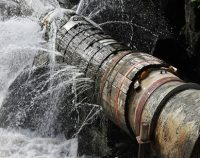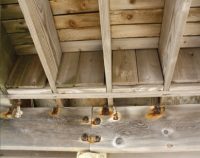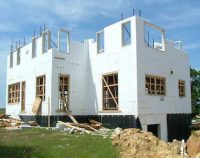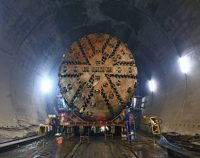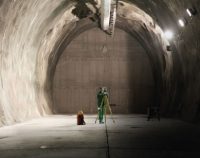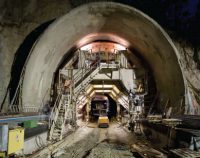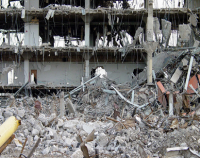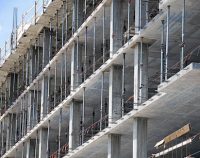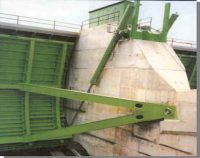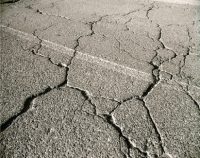Showing 41–60 of 119 results
Conduits, Culverts, and Pipes Part II: 4 PDH
$24.00 Add to cartPart II of a two-part series. This course provides guidance on the design and construction of conduits, culverts, and pipes, and the design procedures for trench/embankment earth loadings, highway loadings, railroad loadings, surface concentrated loadings, internal/external fluid pressures, cast-in-place conduits for dams, circular reinforced concrete pipe for small dams and levees, and corrugated metal pipe for rural levees and culverts.Instructor: Raymond Bosek, PEPart II of a two-part series. This course provides guidance on the design and construction of conduits, culverts, and pipes, and the design procedures for trench/embankment earth loadings, highway loadings, railroad loadings, surface concentrated loadings, internal/external fluid pressures, cast-in-place conduits for dams, circular reinforced concrete pipe for small dams and levees, and corrugated metal pipe for rural levees and culverts.
SPECIFIC KNOWLEDGE OR SKILL OBTAINED
This course teaches the following specific knowledge and skills:
- Material selection
- Installation methods
- Loadings
- Method of analysis
- Joints & camber
- Life cycle design
CERTIFICATE OF COMPLETION
You will be able to immediately print a certificate of completion after passing a 20 question multiple-choice quiz. The quiz can be retaken unlimited times until a passing grade of 70% or better is earned. This course satisfies 4 professional development hours (PDH) of continuing education.
Preview CourseClick “Preview Course” to View Prior to PurchaseClick “Add to Cart” to Purchase and Access QuizConstruction Site Safety: 0.5 PDH
$6.00Original price was: $6.00.$0.00Current price is: $0.00. Add to cartIn this course the student will study the top ten construction site safety hazards. The student will understand the most common construction site safety hazards and the methods to mitigate these hazards to increase safety for all personnel.Instructor: Raymond Bosek, PEIn this course the student will study the top ten construction site safety hazards. The student will understand the most common construction site safety hazards and the methods to mitigate these hazards to increase safety for all personnel.
SPECIFIC KNOWLEDGE OR SKILL OBTAINED
This course teaches the following specific knowledge and skills:
- Identify common construction site hazards
- Discuss safety practices to decrease hazard risks
- Explain guidelines to increase hazard awareness and prevent accidents
- Discuss Personal Protective Equipment (PPE) and its uses
- Understand Hazard communication
- Utilize Safety Checklists
CERTIFICATE OF COMPLETION
You will be able to immediately print a certificate of completion after passing a 10 question multiple-choice quiz. The quiz can be retaken unlimited times until a passing grade of 70% or better is earned. This course satisfies 0.5 professional development hours (PDH) of continuing education.
Preview CourseClick “Preview Course” to View Prior to PurchaseClick “Add to Cart” to Purchase and Access QuizCorrosion Protection for Metal Fasteners in Coastal Areas: 3 PDH
$18.00 Add to cartIn this online course a student will understand material design and selection of metal fasteners and connectors on structures in coastal areas for increased corrosion-resistance.Instructor: Raymond Bosek, PESPECIFIC KNOWLEDGE OR SKILL OBTAINED
This course teaches the following specific knowledge and skills:
- Discuss the importance of using corrosion-resistant metal connectors and fasteners in coastal areas
- Discuss regulations and codes in corrosion resistance material selection for fasteners
- Explain the causes of corrosion in coastal areas
- Understand types of corrosion-resistant metal connectors and fasteners
- Explain best practices for corrosion resistance
CERTIFICATE OF COMPLETION
You will be able to immediately print a certificate of completion after passing a fifteen (15) question multiple-choice quiz. The quiz can be retaken unlimited times until a passing grade of 70% or better is earned. This course satisfies three (3) continuing education hour (CEH)/professional development hour (PDH) of continuing education.
Preview CourseClick” Preview Course” to View Prior to PurchaseClick “Add to Cart” to Purchase and Access QuizCost Benefit of ICF: 2 PDH
$12.00 Add to cartThis online course is based on a guide that provides cost comparisons of ICF construction to standard residential wood-frame construction, a comprehensive cost analysis of the monthly costs of home ownership for wood-frame and ICF homes, and a detailed discussion regarding many of the structural and energy performance benefits gained through the use of ICFs.Instructor: Raymond Bosek, PEThis online course is based on a guide that provides cost comparisons of ICF construction to standard residential wood-frame construction, a comprehensive cost analysis of the monthly costs of home ownership for wood-frame and ICF homes, and a detailed discussion regarding many of the structural and energy performance benefits gained through the use of ICFs.
The student must take a multiple-choice quiz consisting of ten (10) questions at the end of this course to earn PDH credits.
SPECIFIC KNOWLEDGE OR SKILL OBTAINED
This course teaches the following specific knowledge and skills:
- Become familiar with ICF construction
- Be made aware of the many benefits gained through the use of ICF construction
- Comparative performance and cost comparison of ICF home vs wood frame home
- Structral safety and hazard mitigation
- Energy cost comparison of ICF home
CERTIFICATE OF COMPLETION
You will be able to immediately print a certificate of completion after passing a 10 question multiple-choice quiz. The quiz can be retaken unlimited times until a passing grade of 70% or better is earned. This course satisfies 2 professional development hours (PDH) of continuing education.
Preview CourseClick “Preview Course” to View Prior to PurchaseClick “Add to Cart” to Purchase and Access QuizDeck Design for Steel Bridges: 4 PDH
$24.00 Add to cartIn this course the student will understand design options & methods for various steel bridge deck types such as concrete deck slabs, metal grid decks, orthotropic steel decks, wood decks, and several others. Instructor: Raymond Bosek, PESPECIFIC KNOWLEDGE OR SKILL OBTAINED
This course teaches the following specific knowledge and skills:
- Explain analysis and design methods of concrete decks
- Understand the different types of precast deck slabs and placement sequence
- Describe formwork and methods
- Describe metal grid decks and design considerations
- Understand design & construction methods of metal grid decks
- Describe orthotropic steel decks and design considerations
- Understand design & construction methods of orthotropic steel decks
- Explain wood decks and the various types
- Describe other types of deck systems and design consideration
CERTIFICATE OF COMPLETION
You will be able to immediately print a certificate of completion after passing a 21 question multiple-choice quiz. The quiz can be retaken unlimited times until a passing grade of 70% or better is earned. This course satisfies four professional development hours (PDH) of continuing education.
Preview CourseClick “Preview Course” to View Prior to PurchaseClick “Add to Cart” to Purchase and Access QuizDesign and Construction of Road Tunnels-Part 1 Planning: 5 PDH
$30.00 Add to cartIn this course the student will come to understand a general overview of the planning process of a road tunnel project, geometrical requirements and recommendations of new road tunnels, investigative techniques and parameters required for planning, construction and design of road tunnels, and the different types of reports required for a road tunnel project.Instructor: Raymond Bosek, PEIn this course the student will come to understand a general overview of the planning process of a road tunnel project, geometrical requirements and recommendations of new road tunnels, investigative techniques and parameters required for planning, construction and design of road tunnels, and the different types of reports required for a road tunnel project.SPECIFIC KNOWLEDGE OR SKILL OBTAINED
This course teaches the following specific knowledge and skills:
- General tunnel design parameters
- Alternative analyses
- Tunnel studies
- Operation and financial planning
- Geometric configurations
- Geotechnical investigations
- Geotechnical Reports
CERTIFICATE OF COMPLETION
You will be able to immediately print a certificate of completion after passing a 30 question multiple-choice quiz. The quiz can be retaken unlimited times until a passing grade of 70% or better is earned. This course satisfies five (5) professional development hours (PDH) of continuing education.
Preview CourseClick “Preview Course” to View Prior to PurchaseClick “Add to Cart” to Purchase and Access QuizDesign and Construction of Road Tunnels-Part 2 Methodology and Excavation Support: 5 PDH
$30.00 Add to cartIn this course the student will understand the construction methodology and excavation support systems for cut-and-cover road tunnels, design and construction issues for rock and soft ground tunneling, and the special approaches that must be made when passing through difficult ground.Instructor: Raymond Bosek, PEIn this course the student will understand the construction methodology and excavation support systems for cut-and-cover road tunnels, design and construction issues for rock and soft ground tunneling, and the special approaches that must be made when passing through difficult ground.SPECIFIC KNOWLEDGE OR SKILL OBTAINED
This course teaches the following specific knowledge and skills:
- Cut and cover tunnels
- Rock Tunneling
- Softground tunneling
- Difficult ground tunneling
- Structural design and subsystems
- Groundwater control
- Tunnel support design
- Permanent lining design
- Soil stabilization
- Instability and heaving loads
CERTIFICATE OF COMPLETION
You will be able to immediately print a certificate of completion after passing a 30 question multiple-choice quiz. The quiz can be retaken unlimited times until a passing grade of 70% or better is earned. This course satisfies five (5) professional development hours (PDH) of continuing education.
Preview CourseClick “Preview Course” to View Prior to PurchaseClick “Add to Cart” to Purchase and Access QuizDesign and Construction of Road Tunnels-Part 3 Design and Detailing: 5 PDH
$30.00 Add to cartIn this course the student will understand the concepts of the sequential excavation method as well as the design, purpose and construction of tunnel linings, immersed tunnels, and jacked box tunnels.Instructor: Raymond Bosek, PEIn this course the student will understand the concepts of the sequential excavation method as well as the design, purpose and construction of tunnel linings, immersed tunnels, and jacked box tunnelsSPECIFIC KNOWLEDGE OR SKILL OBTAINED
This course teaches the following specific knowledge and skills:
- Sequential excavation method
- Tunnel lining
- Immersed tunnels
- Jacked box tunneling
- Ground classsification
- Instrumentation and monitoring
- Construction methodolgies
- Ground control and watertightness
CERTIFICATE OF COMPLETION
You will be able to immediately print a certificate of completion after passing a 30 question multiple-choice quiz. The quiz can be retaken unlimited times until a passing grade of 70% or better is earned. This course satisfies five (5) professional development hours (PDH) of continuing education.
Preview CourseClick “Preview Course” to View Prior to PurchaseClick “Add to Cart” to Purchase and Access QuizDesign and Construction of Road Tunnels-Part 4 Obstacles and Mitigations: 5 PDH
$30.00 Add to cartIn this course the student will understand the reasons and methods to consider regarding seismic activity in the design process. The concepts of mined/bored tunnel construction engineering. Also, how to monitor the performance of the tunnel construction process, and how to identify, characterize and repair tunnels.Instructor: Raymond Bosek, PEIn this course the student will understand the reasons and methods to consider regarding seismic activity in the design process. The concepts of mined/bored tunnel construction engineering. Also, how to monitor the performance of the tunnel construction process, and how to identify, characterize and repair tunnels.SPECIFIC KNOWLEDGE OR SKILL OBTAINED
This course teaches the following specific knowledge and skills:
- Seismis considerations and evaluation
- Tunnel construction engineering
- Staging and sequencing
- Instrumentation
- Gorund movements and groundwater behavior
- Tunnel Rehabilation
- Structural and lining repairs
CERTIFICATE OF COMPLETION
You will be able to immediately print a certificate of completion after passing a 25 question multiple-choice quiz. The quiz can be retaken unlimited times until a passing grade of 70% or better is earned. This course satisfies five (5) professional development hours (PDH) of continuing education.
Preview CourseClick “Preview Course” to View Prior to PurchaseClick “Add to Cart” to Purchase and Access QuizDesign and Development of Hybrid Power Plants: 4 PDH
$24.00 Add to cartIn this course the student will understand the hybrid power plant and the necessary design and planning details required to ensure reliable and efficient means for power production. Instructor: Juan Pesante, PESPECIFIC KNOWLEDGE OR SKILL OBTAINED
This course teaches the following specific knowledge and skills:
- Understand the hybrid power plant
- Discuss hybrid power plant resources and market opportunities
- Discuss plant design and optimization
- Discuss plant control and operation
- Explain hybrid power plant market and technology challenges
CERTIFICATE OF COMPLETION
You will be able to immediately print a certificate of completion after passing a 20 question multiple-choice quiz. The quiz can be retaken unlimited times until a passing grade of 70% or better is earned. This course satisfies four (4) hours of professional development (PDH).
Preview CourseClick “Preview Course” to view prior to purchaseClick “Add to Cart” to purchaseDesign of Commercial Buildings to Mitigate Terrorist Attacks: 4 PDH
$24.00 Add to cartThis course provides guidance to engineers in methods to mitigate the effects of hazards resulting from terrorist attacks on new buildings. While focusing primarily on explosive attacks and design strategies to mitigate the effects of explosions, the course also addresses design strategies to mitigate the effects of chemical, biological and radiological attacks. In addition to the applicability to the design of new commercial office, retail, multi-family residential, and light-industrial buildings, many of the concepts presented are also applicable to other building types and/or existing buildings.Instructor: Raymond Bosek, PEThis course provides guidance to engineers in methods to mitigate the effects of hazards resulting from terrorist attacks on new buildings. While focusing primarily on explosive attacks and design strategies to mitigate the effects of explosions, the course also addresses design strategies to mitigate the effects of chemical, biological and radiological attacks. In addition to the applicability to the design of new commercial office, retail, multi-family residential, and light-industrial buildings, many of the concepts presented are also applicable to other building types and/or existing buildings.
SPECIFIC KNOWLEDGE OR SKILL OBTAINED
This course teaches the following specific knowledge and skills:
- Design strategies to enhance life safety of building occupants
- Incremental steps to produce fully developed security measures
- Multi-disciplinary approach to security design
- Complex trade-offs required when designing security into a building
CERTIFICATE OF COMPLETION
You will be able to immediately print a certificate of completion after passing a 20 question multiple-choice quiz. The quiz can be retaken unlimited times until a passing grade of 70% or better is earned. This course satisfies 4 professional development hours (PDH) of continuing education.
Preview CourseClick “Preview Course” to View Prior to PurchaseClick “Add to Cart” to Purchase and Access QuizDesign of Heavy Duty Concrete Floor Slabs on Grade: 3 PDH
$18.00 Add to cartThis course describes the criteria for the design of concrete floor slabs on grade in buildings for heavy loads. Concrete floor slabs on grade are often subjected to heavy loads in buildings such as wall loads, stationary live loads and moving loads. The entire design procedure is based on a working stress concept. This course will provide the student with the criteria needed to design concrete floor slabs on grade subjected to heavy loads. Design examples are shown to aid in understanding the course material.Instructor: Raymond Bosek, PEThis course describes the criteria for the design of concrete floor slabs on grade in buildings for heavy loads. Concrete floor slabs on grade are often subjected to heavy loads in buildings such as wall loads, stationary live loads and moving loads. The entire design procedure is based on a working stress concept. This course will provide the student with the criteria needed to design concrete floor slabs on grade subjected to heavy loads. Design examples are shown to aid in understanding the course material.
SPECIFIC KNOWLEDGE OR SKILL OBTAINED
This course teaches the following specific knowledge and skills:
- The steps required to design a heavy duty concrete floor slab
- How to determine floor slab requirements for wall loads, stationary wall loads and moving loads
- How to investigate the subgrade and environmental conditions relevant to the design
- How to determine the modulus of subgrade reaction for various soils
CERTIFICATE OF COMPLETION
You will be able to immediately print a certificate of completion after passing a 15 question multiple-choice quiz. The quiz can be retaken unlimited times until a passing grade of 70% or better is earned. This course satisfies 3 professional development hours (PDH) of continuing education.
Preview CourseClick “Preview Course” to View Prior to PurchaseClick “Add to Cart” to Purchase and Access QuizDesign of Hydraulic Steel Structures: 4 PDH
$24.00 Add to cartProper design, construction, and maintenance of hydraulic steel structures (HSS) is imperative for safe operation and reliable service over the structure’s lifetime. Engineers charged with the responsibility of maintaining these structures must be familiar with the basics of HSS design, as well as the intricacies of the structure’s abilities and limitations. This 4 hour interactive course prescribes guidance for (a) designing hydraulic steel structures (HSS) by load and resistance factor design (LRFD) and (b) fracture control. Allowable stress design (ASD) guidance is provided as an alternative design procedure or for those structure types where LRFD criteria have yet to be developed.Instructor: Raymond Bosek, PEProper design, construction, and maintenance of hydraulic steel structures (HSS) is imperative for safe operation and reliable service over the structure’s lifetime. Engineers charged with the responsibility of maintaining these structures must be familiar with the basics of HSS design, as well as the intricacies of the structure’s abilities and limitations. This 4 hour interactive course prescribes guidance for (a) designing hydraulic steel structures (HSS) by load and resistance factor design (LRFD) and (b) fracture control. Allowable stress design (ASD) guidance is provided as an alternative design procedure or for those structure types where LRFD criteria have yet to be developed. Hydraulic steel structures are lock gates, tainter gates, tainter valves, bulkheads and stoplogs, vertical lift gates, components of hydroelectric and pumping plants, and miscellaneous structures such as lock wall accessories, local flood protection gates, and outlet works gates. HSS may be subject to submergence, wave action, hydraulic hammer, cavitation, impact, corrosion, and severe climatic conditions.
SPECIFIC KNOWLEDGE OR SKILL OBTAINED
This course teaches the following specific knowledge and skills:
- Discuss the benefits of the LRFD method over the ASD method of designs
- List the modes of failure for HSS and what design principles are used to address these issues
- Describe the types of HSS and their corresponding uses and allowable stress loads
- Name the different types of HSS connections, including their design specifications and appropriate uses
CERTIFICATE OF COMPLETION
You will be able to immediately print a certificate of completion after passing a 20 question multiple-choice quiz. The quiz can be retaken unlimited times until a passing grade of 70% or better is earned. This course satisfies 4 professional development hours (PDH) of continuing education.
Preview CourseClick “Preview Course” to View Prior to PurchaseClick “Add to Cart” to Purchase and Access QuizDesign of Small Water Systems: 3 PDH
$18.00 Add to cartThis course focuses on criteria for water source development, design of small water supply, treatment, and distribution systems. This professional engineer online course is from the U.S. Army Corps of Engineers manual on the Design of Small Water Systems. This manual provides information of interest to planners and designers of small water systems. The major emphasis of this course is on the design of systems that will be effective and reliable, requiring a level of operation and management activity commensurate with their physical size and the available sources.Instructor: Raymond Bosek, PEThis course focuses on criteria for water source development, design of small water supply, treatment, and distribution systems. This professional engineer online course is from the U.S. Army Corps of Engineers manual on the Design of Small Water Systems. This manual provides information of interest to planners and designers of small water systems. The major emphasis of this course is on the design of systems that will be effective and reliable, requiring a level of operation and management activity commensurate with their physical size and the available sources.
SPECIFIC KNOWLEDGE OR SKILL OBTAINED
This course teaches the following specific knowledge and skills:
- Preliminary Water System Planning and Design Considerations
- Water Quality Requirements (State, EPA, local)
- Water Quantity Requirements
- Water Source Options and Source Development
- Water Treatment Unit Operations such as Disinfection, Iron Removal
- Manganese Removal, Hardness Removal, Taste and Odor Removal
- Stability and Corrosion Control, Turbidity Removal, Color Removal, and many other technologies and their applications
CERTIFICATE OF COMPLETION
You will be able to immediately print a certificate of completion after passing a 20 question multiple-choice quiz. The quiz can be retaken unlimited times until a passing grade of 70% or better is earned. This course satisfies 3 professional development hours (PDH) of continuing education.
Preview CourseClick “Preview Course” to View Prior to PurchaseClick “Add to Cart” to Purchase and Access QuizDeterioration of Concrete: 2 PDH
$12.00 Add to cartIn this course, the student will review Chapter 3, Causes of Distress and Deterioration of Concrete from Engineer Manual (EM) 1110-2-2002, “Engineering and Design – Evaluation and Repair of Concrete Structures” published by the U.S. Army Corp of Engineers (issued 30 June 1995). This course is most relevant to engineers wishing to attain knowledge on the most common causes of problems in concrete. The course also provides a brief description of the basic mechanism of each common problem, a description of the typical symptoms that would be observed during a visual inspection, and suggests preventative methods or techniques to prevent further damage.Instructor: Raymond Bosek, PEA basic understanding of the underlying causes of concrete deficiencies is essential to performing meaningful evaluations which lead to the proper selection of the method or technique used to successfully repair concrete. Symptoms or observations of a deficiency must be differentiated from the actual cause of the deficiency, and it is imperative that causes and not symptoms be addressed in repairs. Deterioration of concrete is an extremely complex subject since, in most cases, the damage detected will be the result of more than one mechanism.
In this course, the student will review Chapter 3, Causes of Distress and Deterioration of Concrete from Engineer Manual (EM) 1110-2-2002, “Engineering and Design – Evaluation and Repair of Concrete Structures” published by the U.S. Army Corp of Engineers (issued 30 June 1995). This course is most relevant to engineers wishing to attain knowledge on the most common causes of problems in concrete. The course also provides a brief description of the basic mechanism of each common problem, a description of the typical symptoms that would be observed during a visual inspection, and suggests preventative methods or techniques to prevent further damage.
SPECIFIC KNOWLEDGE OR SKILL OBTAINED
This course teaches the following specific knowledge and skills:
- Common causes of concrete deterioration
- Symptoms of concrete distress and deterioration that can be found during visual inspections
- Preventative measures to reduce or eliminate further concrete degradation.
CERTIFICATE OF COMPLETION
You will be able to immediately print a certificate of completion after passing a 10 question multiple-choice quiz. The quiz can be retaken unlimited times until a passing grade of 70% or better is earned. This course satisfies 2 professional development hours (PDH) of continuing education.
Preview CourseClick” Preview Course” to View Prior to PurchaseClick “Add to Cart” to Purchase and Access QuizDistressed Pavements Identification: 3 PDH
$18.00 Add to cartThis course enables the student to understand, evaluate, and determine which type of pavement distress is taking place on roadways and paved surfaces. The student will learn how to identify different types of pavement distresses and , severity levels, means to measure the distresses and methods to document.Instructor: Raymond Bosek, PESPECIFIC KNOWLEDGE OR SKILL OBTAINED
This course teaches the following specific knowledge and skills:
- Identifying distresses in different surfaces
- Understanding and identifying the severity levels
- How to measure the distresses
- Methods to document /li>
CERTIFICATE OF COMPLETION
You will be able to immediately print a certificate of completion after passing a 15 question multiple-choice quiz. The quiz can be retaken unlimited times until a passing grade of 70% or better is earned. This course satisfies three (3) professional development hours (PDH) of continuing education.
Preview CourseClick “Preview Course” to View Prior to PurchaseClick “Add to Cart” to Purchase and Access QuizDurability by Design: 5 PDH
$30.00 Add to cartIn this course the student will receive guidance on designing durable homes for today’s housing industry, addressing critical topics, including water vapor management, envelope design, and natural hazards. Instructor: Raymond Bosek, PESPECIFIC KNOWLEDGE OR SKILL OBTAINED
This course teaches the following specific knowledge and skills:
- Explain durability and critical areas of concern on residential structures
- Understand the negative effects of ground water, rain water, and water vapor
- Discuss HVAC and plumbing designs for durability/li>
- Discuss effects of solar radiation and mitigation techniques
- Explain decay, corrosion, and natural hazards effects and solutions for durability
CERTIFICATE OF COMPLETION
You will be able to immediately print a certificate of completion after passing a 20 question multiple-choice quiz. The quiz can be retaken unlimited times until a passing grade of 70% or better is earned. This course satisfies five professional development hours (PDH) of continuing education.
Preview CourseClick “Preview Course” to View Prior to PurchaseClick “Add to Cart” to Purchase and Access QuizElectrical Reliability of North American Electric Power Systems: 5 PDH
$30.00 Add to cartIn this course the student will understand the North American interconnected electric grid and will become familiar with the requirements on the users, owners and operators of bulk power system to ensure reliable grid operations.Instructor: Juan Pesante, PESPECIFIC KNOWLEDGE OR SKILL OBTAINED
This course teaches the following specific knowledge and skills:
- Discuss the US Electric Grid system and its history
- Understand the functions and concepts of electric power system operations
- Discuss FERC and the Energy Policy Act of 2005
- Discuss the electric reliability organization
- Explain reliability standards and standard’s development
- Explain reliability compliance, enforcement, and assessments
CERTIFICATE OF COMPLETION
You will be able to immediately print a certificate of completion after passing a 20 question multiple-choice quiz. The quiz can be retaken unlimited times until a passing grade of 70% or better is earned. This course satisfies five professional development hours (PDH) of continuing education.
Preview CourseClick “Preview Course” to View Prior to PurchaseClick “Add to Cart” to Purchase and Access QuizElectrical Safety: 5 PDH
$30.00 Add to cartIn this course the student will understand the dangers and hazards when working with or near electrical power and approaches to work safely to avoid serious injury.Instructor: Juan Pesante, PESPECIFIC KNOWLEDGE OR SKILL OBTAINED
This course teaches the following specific knowledge and skills:
- Explain how electrical shock is received
- Discuss the dangers of electrical shock
- Describe burns caused by electricity
- Discuss the safety model
- Explain recognizing, evaluating, and controlling hazards
- Explain safe work practices
CERTIFICATE OF COMPLETION
You will be able to immediately print a certificate of completion after passing a 20 question multiple-choice quiz. The quiz can be retaken unlimited times until a passing grade of 70% or better is earned. This course satisfies five (5) hours of professional development (PDH).
Preview CourseClick “Preview Course” to view prior to purchaseClick “Add to Cart” to purchaseElectrical Storage Guide for Electrical Engineers: 5 PDH
$30.00 Add to cartThis course provides a thorough overview of current electrical storage technologies including batteries, flywheels, compressed air energy storage (CAES), and pumped storage hydropower (PSH) and is a how-to guide for engineers to aid in the selection, procurement, installation, and/or operation of stationary energy storage systems in today’s electric grid. Instructor: Juan Pesante, PESPECIFIC KNOWLEDGE OR SKILL OBTAINED
This course teaches the following specific knowledge and skills:
- Discuss electricity storage services and benefits
- Understand various forms of current electric storage technologies
- Explain advantages/disadvantages of current electric storage technologies
- Discuss the methodology of evaluating electricity storage
- Discuss storage systems procurement and installation
CERTIFICATE OF COMPLETION
You will be able to immediately print a certificate of completion after passing a twenty (20) question multiple-choice quiz. The quiz can be retaken unlimited times until a passing grade of 70% or better is earned. This course satisfies five (5) professional development hours (PDH) of continuing education.
Preview CourseClick “Preview Course” to View Prior to PurchaseClick “Add to Cart” to Purchase and Access Quiz

